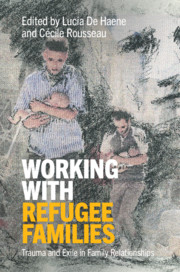Book contents
- Working with Refugee Families
- Working with Refugee Families
- Copyright page
- Dedication
- Contents
- Contributors
- Foreword
- Acknowledgments
- Introduction
- Part I Refugee Family Relationships
- Chapter 1 The Role of Family Functioning in Refugee Child and Adult Mental Health
- Chapter 2 Transgenerational Trauma Transmission in Refugee Families
- Chapter 3 Pre- and Post-migration Trauma and Adversity
- Chapter 4 Cultural Belonging and Political Mobilization in Refugee Families
- Chapter 5 Forced Separation, Ruptured Kinship and Transnational Family
- Chapter 6 Family Relationships and Intra-family Expectations in Unaccompanied Young Refugees
- Part II Trauma Care for Refugee Families
- Part III Intersectoral Psychosocial Interventions in Working with Refugee Families
- Conclusion
- Index
- References
Chapter 1 - The Role of Family Functioning in Refugee Child and Adult Mental Health
from Part I - Refugee Family Relationships
Published online by Cambridge University Press: 21 August 2020
- Working with Refugee Families
- Working with Refugee Families
- Copyright page
- Dedication
- Contents
- Contributors
- Foreword
- Acknowledgments
- Introduction
- Part I Refugee Family Relationships
- Chapter 1 The Role of Family Functioning in Refugee Child and Adult Mental Health
- Chapter 2 Transgenerational Trauma Transmission in Refugee Families
- Chapter 3 Pre- and Post-migration Trauma and Adversity
- Chapter 4 Cultural Belonging and Political Mobilization in Refugee Families
- Chapter 5 Forced Separation, Ruptured Kinship and Transnational Family
- Chapter 6 Family Relationships and Intra-family Expectations in Unaccompanied Young Refugees
- Part II Trauma Care for Refugee Families
- Part III Intersectoral Psychosocial Interventions in Working with Refugee Families
- Conclusion
- Index
- References
Summary
Refugees experience adversities and changes in their lives that profoundly impact family life. Family values and relationships may influence how those events are experienced and the ability of family members to cope with them. The frequent consequences of violence exposure and war events, displacement and resettlement include significant losses and disruptions to relationships and family and community life. Such experiences are associated with a higher prevalence of psychiatric disorders, especially PTSD and depression. The stressors may strain family relations and result in insecure infant-parent attachment and family conflict. The process of migration and resettlement may also provide opportunities for assimilation into a safer and more affluent society and enable changes in family relationships, with opportunities for new, rewarding roles for some family members but for others occupational and status decline and low morale. Over time, refugees’ mental health and social adaptation improves. Refugees show significant resilience - most cope well even when faced with harrowing adversities - but this is more likely in the presence of confiding and supportive family relationships.
Keywords
- Type
- Chapter
- Information
- Working with Refugee FamiliesTrauma and Exile in Family Relationships, pp. 17 - 35Publisher: Cambridge University PressPrint publication year: 2020
References
- 8
- Cited by

